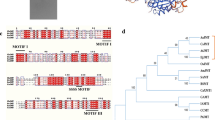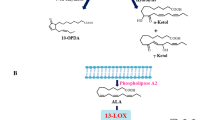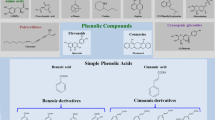Abstract.
During the glyoxysomal β-oxidation of long-chain acyl-CoAs, short-chain intermediates accumulate transiently (Kleiter and Gerhardt 1998, Planta 206: 125–130). The studies reported here address the underlying factors. The studies concentrated upon the aspects of (i) chain length specificity and (ii) metabolic regulation of the glyoxysomal β-oxidation of sunflower (Helianthus annuus L.) cotyledons. (i) Concentration-rate curves of the β-oxidation of acyl-CoAs of various chain lengths showed that the β-oxidation activity towards long-chain acyl-CoAs was higher than that towards short-chain acyl-CoAs at substrate concentrations <20 μM. At substrate concentrations >20 μM, long-chain acyl-CoAs were β-oxidized more slowly than short-chain acyl-CoAs because the β-oxidation of long-chain acyl-CoAs is subject to substrate inhibition which had already started at 5–10 μM substrate concentration and results from an inhibition of the multifunctional protein (MFP) of the β-oxidation reaction sequence. However, low concentrations of free long-chain acyl-CoAs are rather likely to exist within the glyoxysomes due to the acyl-CoA-binding capacity of proteins. Consequently, the β-oxidation rate towards a parent long-chain acyl-CoA will prevail over that towards the short-chain intermediates. (ii) Low concentrations (≤5 μM) of a long-chain acyl-CoA exerted an inhibitory effect on the β-oxidation rate of butyryl-CoA. Reversibility of the inhibition was observed as well as metabolization of the inhibiting long-chain acyl-CoA. Regarding the activities of the individual β-oxidation enzymes towards their C4 substrates in the presence of a long-chain acyl-CoA, the MFP activity exhibited strong inhibition. This inhibition appears not to be due to the detergent-like physical properties of long-chain acyl-CoAs. The results of the studies, which are consistent with the observation that short-chain intermediates accumulate transiently during complete degradation of a long-chain acyl-CoA, suggest that the substrate concentration-dependent chain-length specificity of the β-oxidation and a metabolic regulation at the level of MFP are factors determining this transient accumulation.
Similar content being viewed by others
Author information
Authors and Affiliations
Additional information
Received: 2 February 1999 / Accepted: 14 April 1999
Rights and permissions
About this article
Cite this article
Gerhardt, B., Fischer, K., Deittert, M. et al. Substrate inhibition and affinities of the glyoxysomal β-oxidation of sunflower cotyledons. Planta 209, 355–363 (1999). https://doi.org/10.1007/s004250050643
Issue Date:
DOI: https://doi.org/10.1007/s004250050643




